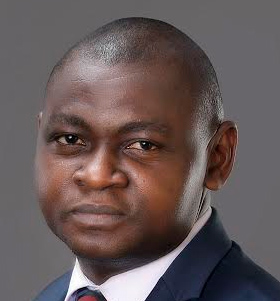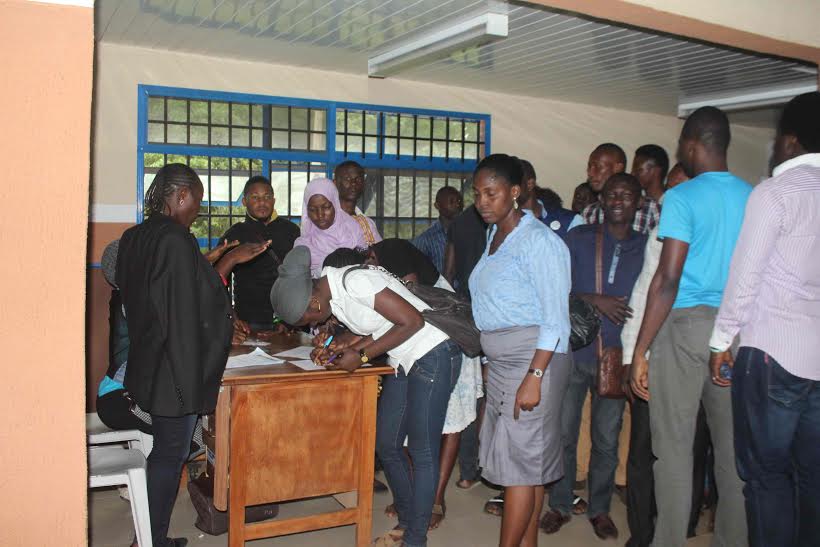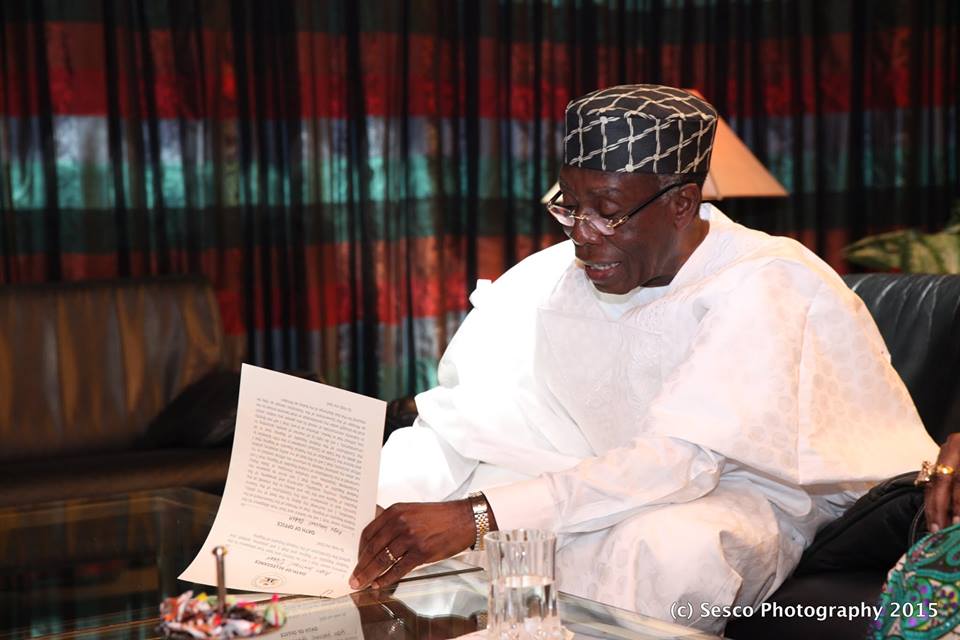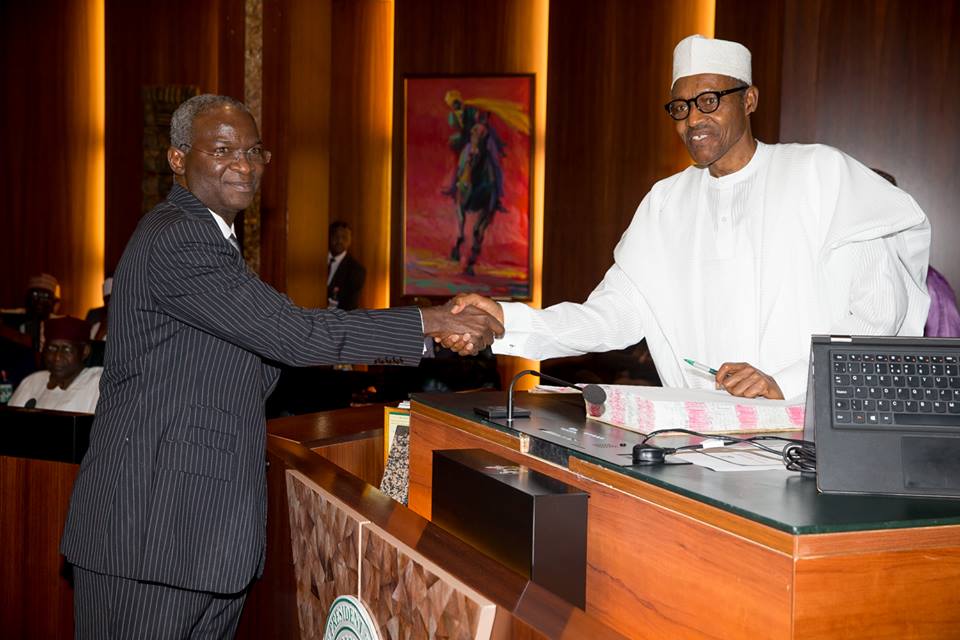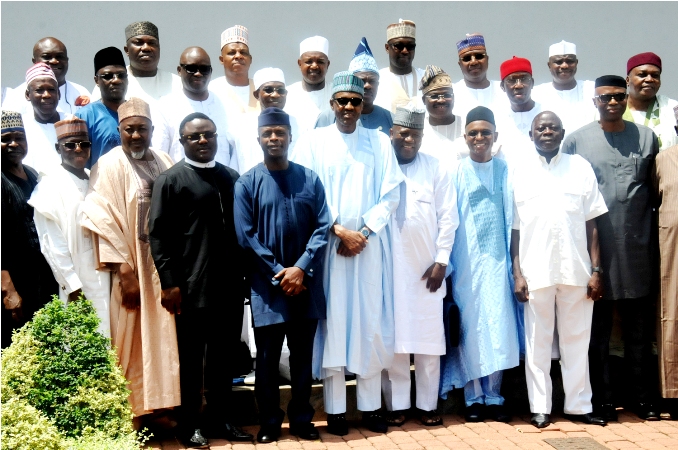Now that ministers have been sworn in and they’re already working to justify the confidence reposed in them by their boss, President Muhammadu Buhari, and living up to the expectations of Nigerians, Mr. President’s boss, I feel it is appropriate at this time, to take a brief look back and discuss one key aspect of the last electoral process and its outcome especially as it relates to Nigerian youths.
With the role Nigerian youths played in actualising the victory of the All Progressives Congress (APC) and President Buhari during the March 28, 2015 Presidential Elections, expectations were that one or two youths would make the cabinet of the President when constituted.
Many had thought, and rightly so, that the youths would be compensated for the critical role they played not just on social media canvassing for votes and mobilising one another across the length and breadth of the country, but for actually walking the talk by casting their votes for APC and its ‘change’ on election day. Alas, this was not to be, despite the fact that they assisted the party in achieving the almost impossible by successfully unseating an incumbent, former President Goodluck Jonathan and his party, the PDP, which had been in power since 1999!
Like I wrote in my last article, I believe President Buhari’s new ministers generally have what it takes to move Nigeria to the next level and give citizens a cheery new story of governance in our country if they put their minds to it.
Advertisement
However, I want to add that I find it worrisome and extremely disappointing that the President couldn’t find one or two Nigerians, who fall within the youth age bracket, in Nigeria or overseas, who are up to it in patriotism, competence, intellectual soundness, maturity, integrity, or ability to deliver, who can be in his team.
Now, I need to clarify that while arguments continue in Nigeria and around the world on who really is a youth or what age is youth, there are those who say youth could be someone under 20, someone under 30, someone under 35, or someone under 40, depending on the context. There are those who say it must be limited to young people between the ages of 18 and 35. Because of the political context of this discussion, however, and our setting here in Nigeria, I will define youth as someone not more than 45 years old.
Among President Buhari’s new ministers, none of them for instance, is within the 30 to 40 years age bracket. Not one is even in the early 40s. All are older. Yet, in the past, we had a Head of State, Yakubu Gowon, who in 1966, at just 32 years, started leading Nigeria and was in power for nine years till 1975. At 41 years, Gowon was already a Former Head of State!
Advertisement
Coming nearer home, 16 years ago when the military handed over power to civilians, Salisu Buhari, who became Speaker of the House of Representatives, was a young man in his early 30s. Ghali Umar Na’aba who succeeded him was a 41-year old at the time. Of course, the position of Speaker of the House of Reps is powerful and fourth in the country’s constitutional hierarchy after the President, the Vice-president and the Senate President. Former Senate President, Anyim Pius Anyim, was voted into the office at 39 years old. At 44 years, Babatunde Raji Fashola was voted to administer Lagos as Governor in 2007 and he went on to blow our minds with his outstanding performance in office.
I have mentioned all these names to simply illustrate that some had achieved what Nigerian youths today haven’t achieved in this current democratic dispensation.
Outside politics, Nigerian youths, specifically in sports, have proven themselves and continue to do so over and over again. In entertainment, the Olamides, Don Jazzys, P-Squares, Tufaces, Davidos, Tiwa Savages and others keep churning out award-winning hits and transforming an industry. In the movies, youths like Mercy Johnson, Omotola Jalade-Ekehinde, Genevieve Nnaji, Ini Edo, Ramsey Nouah, Desmond Elliot and others, continue to publicise Nigeria through Nollywood which is reckoned with globally. In literature, one of their own, sorry, our own, Chimamanda Ngozi Adichie, is globally acclaimed and honoured as the best of the best.
So, why is it that Nigerian youths are losing out politically? Why is it that the youths appear only good for being used winning elections but not good enough to participate in governance at the highest level? Why is it difficult for Nigerian youths to replicate the successes they’ve made in other areas and bring it to politics? I will humbly attempt to provide some answers.
Advertisement
Nigerian youths, in recent times, generally don’t come across as bold enough when it comes to national politics. That’s point number one. They appear too timid to throw their hat in the ring and face whatever punches are thrown at them.
Popular Nollywood actor, Desmond Elliot, granted an interview to one of the news magazines in the country about 10 years ago. In the interview, Elliot said his ambition is to become Lagos state Governor some day. I guess there are hardly many people in Nigeria today who remember that interview. Back then, I doubt if many people even took the actor serious.
However, Elliot had his vision; he boldly shared it irrespective of public reactions, and ran with it after putting his strategy in place. Today, several years later, Elliot is a lawmaker representing Surulere Constituency 1 in the Lagos State House of Assembly. Even now, he is still talking about his ambition. “I am looking forward to becoming the elected Governor of Lagos State in the not-too-distant future. I want to serve the people of Lagos and I know I can do it.”
No one needs to be told that Elliot, who is 41 years old this year, knows where he is going. Such bold guys like him are the type of Nigerian youths I am talking about. Youths who are bold to share their thoughts and visions for their fatherland! Youths who are bold in contesting for top political positions! Youths with boldness in demanding for what they believe are due to them. And youths with uncommon boldness and sagacity in pushing their ideas through! The world will always make way for the man who knows where he is going. That age-old saying hasn’t changed. Nigerian youths must remember this.
Advertisement
Again, politicians negotiate and enter into different types of agreements and reach deals. They are always after what’s in it for them. So, do youths who are involved in politics even negotiate with party leaders on positions, slots or benefits that would accrue to Nigerian youths when the spoils of office are being shared long before elections? Based on the outcome of the last elections, its aftermath, as well as the cabinet formation and other appointments made by President Buhari so far, I certainly don’t think so. That was clearly a failure. It’s my point number two.
Moreover, Nigerian youths also make all the noise about bad governance, corruption, selfish politicians, unemployment and dilapidated infrastructure, among others but fail to offer their own well-thought out meaningful solutions to these problems or push their ideas hard enough for fellow citizens and political leaders to have no choice than listen to them.
Advertisement
In the early 80s when Pat Utomi was appointed Special Assistant by former President Shehu Shagari when he wasn’t even up to 30 years old, it wasn’t for nothing. Utomi, who got enlisted by former Vice President Alex Ekwueme to provide consultancy on some public policy papers, had already proven his intellectual capacity and the President believed in his competence enough to appoint him. Utomi has been in the public arena since then.
So, how many Nigerian youths are sharing their visions and comprehensive thoughts on national issues in newspaper articles today or on online platforms and proffering the solutions they think can work and subjecting these to debate and interrogation? That’s the third point for consideration.
Advertisement
Furthermore, there are few youths today who can brilliantly discuss the history and trajectory of this country, or are knowledgeable about governance and development, or consciously try to develop their intellectual capacity to understand critical national and global issues. That’s the fourth point.
For example, judging by the negative reactions to the decision to honour the memory of the late Chief MKO Abiola by the former Jonathan government especially from the youths, it’s clear not many of them can impressively situate the significance of Abiola’s sacrifice for Nigeria in preferring to rather die in prison towards actualising the June 12, 1993 Presidential mandate given to him by Nigerians but annulled by the Babangida military junta than going home to his family with nothing to show for it.
Advertisement
It’s even harder to see youths reading biographies or autobiographies of great and outstanding Nigerians and other leaders in the world to discover how others did it and what lessons they can learn.
The fifth point is the particularly painful fact that in our recent past, youths who were given opportunities to serve in very high national offices, have not all lived up to expectation or outstandingly distinguish themselves well enough. Many of them got into office and didn’t bring about the positive change people expect. Most of them showed that they are not really different from the corrupt and discredited politicians they laboured hard to unseat.
Examples include Salisu Buhari who lied about his age and educational qualifications to get into the House of Reps, and was eventually forced to resign in the face of undeniable evidences despite his initial claims of doing no wrong, and former Speaker, Dimeji Bankole, who, with mind-blowing corruption allegations against him, also failed to represent Nigerian youths well when he was in office. His being voted out of the House by his constituency in Ogun state was a just recompense!
However, aside the bad eggs mentioned, Nigerian youths have had some good representations at the highest level of governance in Nigeria. There was Chukwuemeka Chikelu, the matured, good-looking, calm, composed, intelligent and much-loved Minister for Information and National Orientation between July 2003 and June 2005 under President Olusegun Obasanjo. Chikelu, a lawyer, has maintained an extremely low profile since he left office. He’s one guy who proved himself well in office and should be a role model for Nigerian youths aspiring for high political office with the manner he distinguished himself while there.
And there is Bolaji Abdullahi, Minister of Youth Development who was appointed by former President Jonathan in July 2011. Under his watch, Nigeria recorded notable sporting success in Africa and globally. Before then, he had been Commissioner of Education, Science and Technology in his home state of Kwara and transformed the state’s education sector even while he was in his 30s at the time. Abdullahi’s impacts in the public offices he’s held are still being referenced even today.
But overall, I think our political leaders at various levels have also not been too fair to the youths. It’s my sixth point. That’s why I had expected President Buhari to have at least ensured that he included one or two youths as members of his cabinet.
Moving forward, I believe political leaders at various levels need to feel some of the brilliant youths in their parties and camps who have shown interests in politics more and find out the key areas they are gifted in, train them, and offer these youths mentorship and eventually field them to serve. They must remember that a leader is not successful without successful successors.
So, Nigerian youths, my general message to you as I conclude is, stop losing out politically no matter what you feel the leaders have done or left undone. Mobilise yourselves, identify credible and capable ones who have political inclinations among you, or have shown interest in the past that they can be trusted, and support them. You’ve done it for older politicians who haven’t delivered well enough for Nigeria. You can do it for yourselves. Attempt it. Abi, what’s there to lose? If you make mistakes, lessons would be learnt and everyone would be better for it.
And if you are a young person interested in politics, start preparing yourself now if you’ve not started doing so already. When you feel you are ready, boldly declare it. Understand that people will scrutinise you, they will check up on your educational background, judge your intellectual capacity, probe your antecedents, challenge the workability of your ideas, ask tough questions about what you can bring to the table, and even abuse you. But be serious-minded and decent in your approach. If they conclude you are just a noise maker, you’re going nowhere. If they feel you make some sense, there are people who will follow and support you with all they’ve got no matter what it takes just to challenge the norm, break the rules and make history together with you. Remember Obama. Also, remember to engage the traditional media and maximise social media.
Concerning funding your campaign, you will be surprised the number of youths who will be willing to contribute their N100 or even more via their phones to your campaign. Just ensure you start the process. Youths in Nigeria, it’s time to start getting more daring. Even if you don’t get there, it would be clear you gave it your best shot and attempted a great thing in the genuine service of your fatherland. If you won’t take the needed steps, then, stop your complaints.
Finally, you can no longer afford to underestimate the power you’ve got. Start your plans and preparation for the 2019 general elections in earnest. The old politicians have started theirs already. You have the numbers. Use it. You can get much more from your contributions; don’t settle for less. You’re no longer leaders of the future; that’s been proven to be a lie. Today is the time to take charge. So, across this beautiful land, let the strategic preparations by daring Nigerian youths commence now! Tomorrow may be too late.
You can follow this writer on Twitter: @ofemigan
Views expressed by contributors are strictly personal and not of TheCable.
